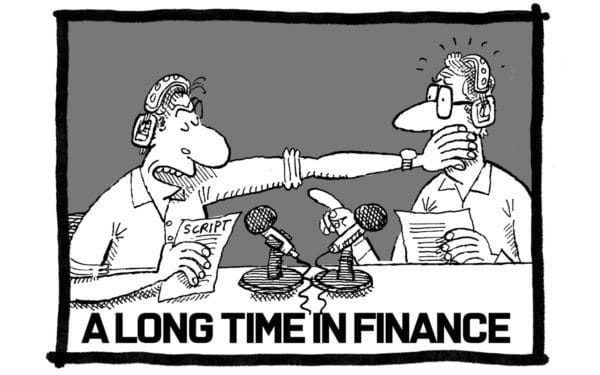This is a story that you may not have come across because it’s been shunned by most of the world’s media. It’s a story about a new report recently published by top economist, Professor David Blake, in which he argues the City of London can become stronger after a “clean” Brexit and an even greater World Financial Centre.
The professor puts his neck out further, asserting that constant claims that the City’s success is based on full access to the EU single market in financial services – including the controversial passporting rights – is baloney and not borne out by his analysis.
So it’s a little odd that none of the UK’s supposedly business savvy TV channels, newswires or newspapers – such as Reuters, the Times, the Guardian, the Financial Times, the Wall Street Journal and its sister newspaper the Financial News – have covered his new research. Only City A.M. and the Daily Express have run stories, and Bloomberg ran one line.
It’s so odd that Blake believes his report is being deliberately ignored because of its optimism which runs counter to the doom and gloom which so many City naysayers like to peddle. Put crudely, he reckons its been sat on. Soviet style.
“I feel like a Russian dissident,” he says. “In this case it’s not the Soviet state that is covering up my work but the Treasury, the big City voices, the US banks and their lobbyists in Brussels and powerful newspapers that are still arguing for Remain. They can’t get over what’s happened. This is a continuation of Project Fear. ”
It’s taken the Cass Business School professor of economics six months to produce Brexit and the City, a 177 page blockbuster of exhaustive analysis which slices through many of Project Fear’s claims that the big banks will flee the City and set up shop on the continent and shows why they are simply wrong or exaggerated. Although a pensions expert, Blake is part of the Economists for Free Trade group and decided he wanted to undertake this research to challenge the veracity of the more extreme Remain scare-mongering claims which worried him.
Take last year’s warning by consultants at Oliver Wyman. They claimed that if the City were to leave the EU’s single market without any regulatory equivalence in a so-called hard Brexit, the UK’s financial sector would lose up to £20 billion in revenue, leading to losses of 35,000 jobs and £5 billion in tax revenue. The Wyman report estimates there would be multiplier effects on the wider UK economy, causing total revenue to drop by another £18 billion, another £5 billion in lost tax revenue and a further 40,000 jobs. If instead, the UK retained access to the EEA on similar terms -or a “soft” Brexit – and could continue trading without the need for individual country licences – the City would lose 4,000 jobs and £2 billion of revenues a year.
Blake argues this is a “gross exaggeration”. His analysis shows that even in the worst case scenario in which the UK were unable to agree on rights, and the UK lost 50% of its revenues due to a loss of passporting, the reduction in revenues would be £7.6 billion or 4.4% of total revenues.
Counter-intuitively, Blake reckons that removing the passport would make the City more attractive rather than less, because much of the regulation has brought unnecessary red tape. And smaller firms would benefit too, as they could compete more easily against the big US banks.
Backing this view is the work of Barney Reynolds, head of the financial services practice at US lawyers, Shearman & Sterling, who argues that rather than being fundamental to the success of the City, passporting is a hindrance and has come at a great cost to the City. Indeed, Reynolds argues that its continuation, or a bilateral EU-UK deal to replace it, would undermine the cost-saving opportunity provided by Brexit. “Passporting requires the UK to implement ill-focused and process-driven EU regulation and that 20% of the City’s business is not enough to justify the blanket application of such EU regulation across the breadth of the City’s global activities.”
It’s a view supported by Stanislas Yassukovich, one of the founding fathers of the UK’s eurobond market in the 1960s, who argues that “the red herring about access for the City to a totally fictional single market in financial services is slowly drowning in a sea of truth… The quest for ‘soft Brexit’ wastes time and money, delays the necessary reforms of affected economic sectors, and the onset of the clear benefits of leaving the EU.”
Indeed, Blake claims that the big banks which have lobbied hardest against leaving the EU, and still want single market access, welcome the high levels of Brussels regulation precisely because it gives them “regulatory capture” and advantages in competing with the smaller niche firms. They want more of it too.
Blake adds: “The biggest banks- particularly the US ones – like regulation. They want more because they can afford the lobbying in Brussels but also it means they can gain advantage over the smaller firms and gobble them up.”
One of the more intriguing aspects of Project Fear was the high-profile role taken by the big US banks with their persistent and alarmist scare-mongering – banks like Goldman Sachs, JP Morgan and Morgan Stanley, which have been using the City as a aircraft carrier taking them onto the continent ever since the Big Bang reforms of 1986.
Blake has an interesting explanation as to why they are so terrified of losing single market access, one that goes back to the economic history of America’s 19th century golden age and indeed, the psychology of US bankers. “They see the world in big integrated protectionist regional blocs- first they had their own domestic market, then the EU, Asia and so on. These big blocs suit their world outlook.” This outlook he dates back to the early 20th century after the US turned away from a free trade philosophy towards big customs unions. “Germany did the same. This was the period when bankers like JP Morgan and the others started out in business, and they are still comfortable with these regional zones where they can dominate.”
So if Blake were to make headlines in the week that Article 50 is finally let loose, what would he like them to say? Well, he says forget the American scare-mongering, the City should stop whining, stop being so spineless and stop behaving like a supplicant. Play hard-ball instead.
“The idea that City could be snatched by the French or the Germans is as likely as us stealing their cheese or car industries. ”
Like any forecast, it’s impossible to know whether Blake’s prediction of a golden age in a “clean” post-Brexit world may prove to be right or wrong. But it should be heard.



